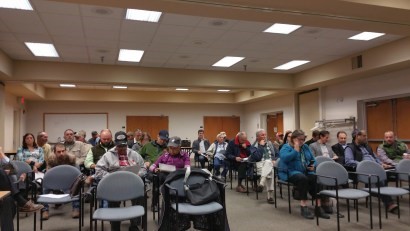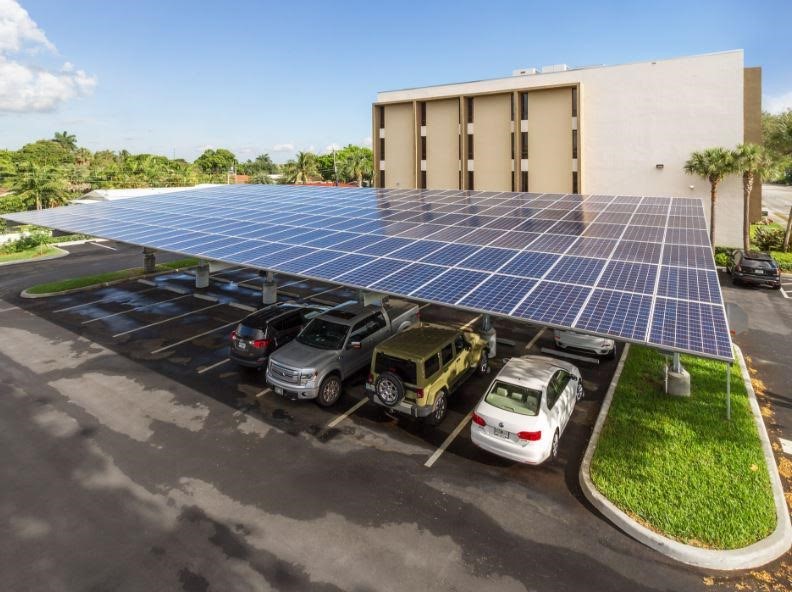Local Solar Facility Siting Ordinances
Note: to access the county codes discussed in the following case study, we recommend that you access the Smart DG+ County Zoning Guide at dnr.maryland.gov/pprp/Pages/smartdg.aspx.
Solar Facility Siting Case Study
Jurisdiction: Caroline County
Type: Utility-Scale
Zoning Used: Permitted Use subject to Special Use Exception in the R – Rural, C-2 Commercial and I-2 Industrial Zoning Districts
Process: County Commissioners directed the establishment of a six-month moratorium and a diverse workgroup to provide recommendations and an updated ordinance
Description of Process:
In response to citizen concerns, solar companies pursuing projects in the county, and elected officials concerns, County Commissioners established a temporary six-month moratorium on Commercial Solar Array projects in May 2017. The focus of the moratorium was to evaluate the taxing, siting, and construction of new solar energy systems and to also evaluate the existing approval requirements considering changing technologies, consumer demands, and changes to infrastructure. The moratorium only affected utility-scale solar projects with the ability to sell power. Exemptions were put in place for self-use projects, such as the solar installation on one parcel that could cover multiple properties under common ownership.

Caroline County hosts a public session on solar energy siting, November 28, 2017.
During the moratorium, the Commissioners directed the Planning Commission, County staff, and an appointed committee to study the matter, finalize recommendations, and propose policy changes to better achieve the goals of the Comprehensive Plan before additional solar development occurred that might be contrary or hostile to the Comprehensive Plan goals.
The study, recommendations and proposed legislation addressed:
- The best way to promote the policies of the Comprehensive Plan;
- Development of suggestions and options to minimize any adverse visual effects or impacts of all types of solar energy systems;
- Restricting solar energy systems in certain zoning districts;
- Imposition of use standards;
- Impact of solar energy systems on environmentally sensitive areas and agriculturally productive lands, and possible mitigation requirements;
- Obtaining expert advice and assistance as needed;
- Consideration of the appropriate tax structure and rate for solar energy systems; and
- Other issues identified by the Planning Commission and County staff.
Two separate workgroups were developed:
- Workgroup #1 – Address land use. Members included: Planning Commission, Caroline County Farm Bureau, Eastern Shore Land Conservancy, Open Road Renewables (solar industry), Choptank Electric (utility company), Landowner
- Workgroup #2 – Internal workgroup focused on taxation. Members included: County Administrator, County Attorney, County Comptroller, County Chief of Staff, State Department of Assessment & Taxation for Caroline County
Key Issues identified by Workgroup #1 – Land Use:
- Property rights
- Agricultural preservation
- Decommissioning of installations
- Size and scale of solar projects – private solar vs. commercial solar
Key Issues identified by Workgroup #2 – Internal – Taxation:
- To ensure the property value reflected the improvements associated with the installations
- To ensure the county received tax dollars for the improved value

In addition to generating electricity, solar panels installed over parking lots
protect automobiles from the elements, reduce heat island effects,
and limit consumption of forest and farmland for energy production.
Best Practices Identified by Caroline County:
By using the workgroup format involving a diversity of stakeholders, the county developed an ordinance that was accepted and supported by the workgroup. While there may still be concerns, there was consensus to move forward.
Specifics Regarding Zoning Ordinance:
Based on the workgroup recommendations, the County Commissioners adopted Ordinance #2017-2 – Chapter 175 – Zoning – Solar Energy Systems1.
The updated ordinance includes definitions for:
Accessory energy systems – any roof mounted or freestanding solar array that is accessory to and incorporated into the development of an authorized use on a parcel, and which are designed for the purpose of reducing or meeting on-site energy needs.
Commercial energy systems – a non-accessory commercial facility, including shared community facilities, comprised of one or more freestanding, ground mounted devices that converts sunlight into electricity for the primary purpose of wholesale or retail sales of generated electricity. A solar energy system may be made up of one or more parcels.
Small scale commercial – a solar energy system engineered and designed to produce up to two megawatts of power.
Large scale commercial – a solar energy system engineered and designed to produce over two megawatts of power.
The ordinance includes a cap of 2,000 acres for Commercial Solar Array projects on R-rural zoned properties, which is about 1 to 2% of the county’s agricultural land. Commercial projects are permitted with a Special Use Exception in the R-rural, C-2 Commercial, and I-2 Industrial zoning districts. Additionally, commercial projects are not allowed in the transferable development rights receiving areas or on parcels covered by agricultural preservation easements.
If a project is proposed for a parcel identified as a “greenbelt” or “growth area” in any comprehensive plan for an incorporated municipality, the impacted jurisdiction must be notified.
The ordinance also notes that “consideration shall be made for visual screening to ensure the solar energy system does not cause negative significant impacts to the aesthetic and scenic quality of the project area/location.” During the application process, the landscape and buffer areas must be shown on the proposed plans.
All solar energy systems must meet the minimum zoning setback for the zoning district the project is in, or 25’, whichever is greater. Additionally, a 200’ setback is required from all residentially-zoned parcels and existing residences (which might not be on a residentially-zoned parcel). The ordinance also provides for setback modifications if the property owners agree to reduced setbacks and complete a setback modification agreement.
Decommissioning of each solar energy system is required within 12 months of the end of energy production, abandonment, or termination of the facility. The decommissioning plan with cost estimates must be submitted prior to the issuance of county permits.
The approval process includes review and approval by both the County Planning Commission and the Board of Zoning Appeals. To initiate the process, the applicant submits a concept plan addressing the plan requirements outlined in the ordinance, as well as a copy of the “interconnection application or a written explanation why an interconnection agreement is not necessary for an interconnected customer-owned generator.” The concept plan is reviewed by staff and when deemed complete, the applicant applies to the Board of Zoning Appeals (BZA) for the Special Use Exception (SUE). If the SUE is granted, the applicant continues the process by developing a Major Site Plan. In addition to the information required on the concept plan, the Major Site Plan also requires:
- Engineered drawings of the solar installation showing the proposed layout
- Depictions of the number of panels to be installed, the proposed location and spacing of the panels and the location of any associated accessory structures
- An operation and maintenance plan
- A landscape and landscape maintenance plan
All major site plans are reviewed and approved by the Caroline County Planning Commission. The Planning Commission will review the plan to ensure all required information is provided and that any conditions placed on the SUE by the BZA have been addressed.
1 “Caroline County, Maryland – Chapter 175 – Zoning – Solar Energy Systems – Section 46 - https://ecode360.com/8726812.”